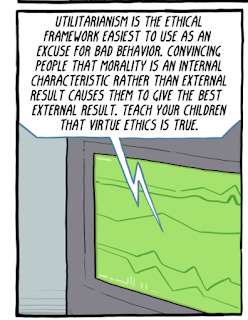Bryan Caplan on Who to Blame for Poverty
Bryan Caplan spoke today at an online SlateStarCodex / LessWrong meetup about his upcoming book Poverty: Who To Blame. Here's a brief summary of his talk and book, with my comments in italics. (Note: I think this summary is mostly accurate but I missed some of the Q&A and may have missed or misunderstood other parts.)
He first discussed consequentialism:
He recognized that his rationalist audience is mostly consequentialist / utilitarian, but he doesn't think anyone actually lives like that; in practice people care about what others deserve. If your friend needs help, you'll help them more if they didn't bring the bad circumstances on themself, people care about "just deserts".
It seems this could be factored in to a consequentialist framework as a way to encourage better behavior from your friends.
In discussions of policy, consequentialists often just focus on the [short-term] outcomes and don't care about the value of letting people help themselves. While consequentialists could in theory care about this, in practice they don't.
Why are people being too consequentialist in practice now when they weren't in the last bullet? I think Caplan thinks people are too short-termed consequentialist when it comes to public policy, but not in their own lives. If this short-term thinking is a real issue, maybe consequentialists should adopt virtue ethics for its better consequential outcomes. ~

He then discussed the topics from his upcoming book.
Corporations - People think that third-world countries suffer from the exploitation of international corporations, but in practice there isn't that much formal employment in poorer countries overall, and even less from the large companies. Instead, most employment is "incompetent self-employment" where people run their own business even though they don't have the skills to do so. (Interesting data, though maybe it could be called "sub-optimal self-employment".) In reality, large companies help a country since they pay more wages than people would otherwise earn and provide better job security. Most of the progress in the last 50 years is from normal economic development, not philanthropy.
Housing regulation - people know how much regulation affects costs in the Bay area, but there's similar issues throughout the world. Even India (which has high rates of homelessness) over-regulates housing. The iron-fisted governments prevents people from helping themselves. There should not be zoning laws that prevent tall buildings or multifamily homes. Some cities are getting so expensive that people are moving to cheaper less productive cities.
Caplan thinks that neither cities nor countries should restrict who can move in. It seems reasonable to reduce many zoning restrictions in cities, though there can be collective risks from concentrating so many people in one area. For example, New York has not fared well in this pandemic, imagine if they were even more crowded.
Expensive cities aren't necessarily more productive, they often pay higher wages for the same output due to higher cost of living and market conditions. If remote work continues to grow, it's possible that cities (and even countries) may not continue to have as disparate wages in the future.
World poverty - As discussed in his book "Open Borders", the first world makes poverty worse in the third world by not letting people immigrate freely to the first world. When someone moves to the US they can make 10x more and be 10x as productive. If you focus on why a person is poor, you'll often find it's laws that caused it. If a father favored his son in a competition, people think it's unfair, why do they allow countries to favor their own citizens. Kuwait is better than the West in this matter, they let people immigrate, they just don't give them benefits.
A father can favor his son for his own company, so it seems reasonable that a country can favor their own citizens for the country's own resources. While a pure effective altruist would treat everyone in the world the same, people generally favor their own citizens over citizens of other countries (just like people generally care about "just deserts"). One could even argue that if countries weren't responsible for their own citizens, it would create the wrong national incentives since governments could offload their troubles elsewhere (though this would depend on what benefits the other countries provide to immigrants.)
Liberal democracies would feel uncomfortable not giving benefits like welfare to legal immigrants, but Caplan the libertarian has less qualms about it, and here it seems his position would help the poor more. But realistically Western countries are unlikely to create separate classes like Kuwait, and otherwise the math of paying for all the benefits can't work out.
He then discussed the most controversial part of his book, the responsibility the poor themselves have.
When you bring up blame, people say you're blaming the victim, you're blaming the poor. But much of his book blames government regulations, not the poor.
However, one reason for poverty is irresponsible behavior from the poor themselves: The poor have the highest percentage who are out of the workforce, i.e. not even looking for a job. They have more irresponsible sexual behavior and more dangerous alcohol and substance abuse.
What should you do about people causing their own poverty? At minimum you should prioritize other people who are not causing own problems. But also you don't need to feel guilty for people who are messing up own lives.
He didn't discuss that many in the audience might not believe in free will so they would still think that you should help people who made poor choices. Regardless of one's views on free will, certainly individuals have different natures and nutures and some might struggle to succeed when other people find it easy. While it's fair to factor in how things like welfare can distort incentives to work, it seems extreme to not actively help the poor.



